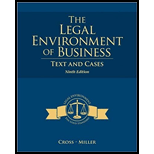
(a)
Case summary: The person MT is a Muslim inmate incarcerated at WCI in Wisconsin. During the month of Ramadan, a core religious practice required him to undertake sunrise to sunset fast. This was accommodated by the prison through the provision of “meal bags” at sunset to each Muslim prisoner. The eligibility criteria were decided by the prison’s chaplain. On two specific days, the person MT was denied meal bags by guard L even though the person MT was on the list maintained, and was further informed by two other guards that his name had been removed by Captain H, which was false. If he wanted to consume food, he had to go to the cafeteria. He was later provided with meal bags till the end of Ramadan. The person MT sued the guards later for breaching his First Amendment rights.
To explain :The cause as well as the clause of the US Constitution that had been violated in the given case.
(b)
Case summary: The person MT is a Muslim inmate incarcerated at WCI in Wisconsin. During the month of Ramadan, a core religious practice required him to undertake sunrise to sunset fast. This was accommodated by the prison through the provision of “meal bags” at sunset to each Muslim prisoner. The eligibility criteria were decided by the prison’s chaplain. On two specific days, the person MT was denied meal bags by guard L even though the person MT was on the list maintained, and was further informed by two other guards that his name had been removed by Captain H, which was false. If he wanted to consume food, he had to go to the cafeteria. He was later provided with meal bags till the end of Ramadan. The person MT sued the guards later for breaching his First Amendment rights.
To find:The reason for how the rule of law had been breached.
(c)
Case summary: The person MT is a Muslim inmate incarcerated at WCI in Wisconsin. During the month of Ramadan, a core religious practice required him to undertake sunrise to sunset fast. This was accommodated by the prison through the provision of “meal bags” at sunset to each Muslim prisoner. The eligibility criteria were decided by the prison’s chaplain. On two specific days, the person MT was denied meal bags by guard L even though the person MT was on the list maintained, and was further informed by two other guards that his name had been removed by Captain H, which was false. If he wanted to consume food, he had to go to the cafeteria. He was later provided with meal bags till the end of Ramadan. The person MT sued the guards later for breaching his First Amendment rights.
To find:The reasoning behind the court’s conclusion that there was a violation of right.
(d)
Case summary: The person MT is a Muslim inmate incarcerated at WCI in Wisconsin. During the month of Ramadan, a core religious practice required him to undertake sunrise to sunset fast. This was accommodated by the prison through the provision of “meal bags” at sunset to each Muslim prisoner. The eligibility criteria were decided by the prison’s chaplain. On two specific days, the person MT was denied meal bags by guard L even though the person MT was on the list maintained, and was further informed by two other guards that his name had been removed by Captain H, which was false. If he wanted to consume food, he had to go to the cafeteria. He was later provided with meal bags till the end of Ramadan. The person MT sued the guards later for breaching his First Amendment rights.
To find:The decision of the federal appellate court regarding the allegations as well as the court’s view for the post order stage.
Trending nowThis is a popular solution!

Chapter 4 Solutions
The Legal Environment of Business: Text and Cases
- Consider the competitive market for rhodium. Assume that no matter how many firms operate in the industry, every firm is identical and faces the same marginal cost (MC), average total cost (ATC), and average variable cost (AVC) curves plotted in the following graph. 100 90 80 70 COSTS (Dollars per pound) 8 50 40 ຊ 20 10, 10 10 + MC ATC AVC Π 0 0 5 10 15 20 25 30 35 40 45 50 QUANTITY (Thousands of pounds) (?)arrow_forwardWant to this question answer general accountingarrow_forwardCalculate stricklers cash conversion cycle? General accountingarrow_forward
 Purchasing and Supply Chain ManagementOperations ManagementISBN:9781285869681Author:Robert M. Monczka, Robert B. Handfield, Larry C. Giunipero, James L. PattersonPublisher:Cengage Learning
Purchasing and Supply Chain ManagementOperations ManagementISBN:9781285869681Author:Robert M. Monczka, Robert B. Handfield, Larry C. Giunipero, James L. PattersonPublisher:Cengage Learning
